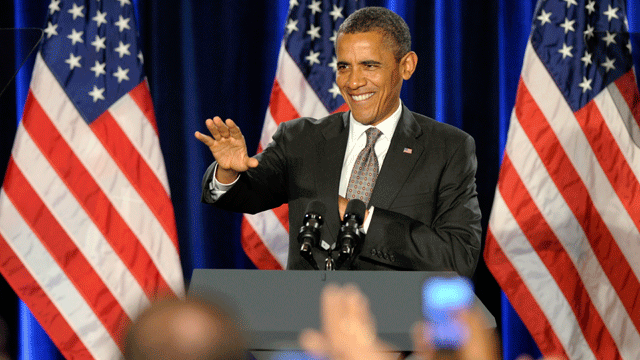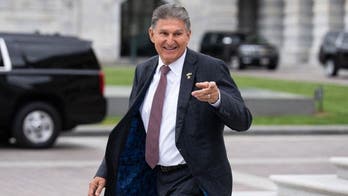
Oct. 4: President Obama speaks at a fundraiser in St. Louis. (AP)
WASHINGTON – WASHINGTON -- President Obama's campaign raised more than $70 million for his re-election and the Democratic party during the summer, an amount that gives him a clear advantage over his Republican rivals but is less than his initial fundraising effort.
The fundraising total announced Thursday exceeds a goal set by the campaign of $55 million for the July-September fundraising period but is about $16 million less than Obama raised during the April-June quarter.
Obama has been faced with declining poll numbers and a weakened economy during the summer, prompting the president to recently call himself the "underdog" in the presidential race.
Still, the formidable war chest will help him combat the challenge from the Republicans, who remain locked in a fierce contest to see who will get to challenge Obama in 2012.
Texas Gov. Rick Perry is poised to tap his substantial campaign funds and buy TV ads to criticize the record of the former Massachusetts governor, Mitt Romney, who seems firmly in command of the field.
The biggest question has been when and how Perry would use the advertisements to attack Romney's record on health care, abortion, gay rights and job creation. His campaign dropped broad hints Wednesday that the moment for a flurry of attack ads was near.
Romney, the former governor of a predominantly Democratic state, has been attacked for his shifting positions on social issues that are held dear by conservative voters who dominate the Republican primary season.
"Now that the field is full, the air war will start soon," said Katon Dawson, former chairman of the South Carolina Republican Party and Perry's top adviser in the state.
Romney briefly lost his front-runner status when Perry entered the race in August and seemed to project himself as a more solid conservative. But Perry has stumbled in debate performances, and comments he made on immigration and other issues have alienated some Republicans.
But Perry seems best positioned among Republican contenders to challenge Romney for a chance to defeat Democratic President Barack Obama.
Among Republican contenders, Rep. Michele Bachmann of Minnesota surged in midsummer, then fell as Perry briefly soared.
In recent polls, former pizza company executive Herman Cain has ranked as Romney's top rival, although few campaign strategists believe he will be the nominee.
An NBC-Marist College poll in Iowa found that conservative, anti-tax tea party supporters prefer Cain. In national polls, combined support for Cain, Perry and Bachmann exceeds Romney's support.
A Wall Street Journal/NBC News poll of Republican primary voters released Wednesday found Romney and Cain in a dead heat, while Perry dropped to 16 percent. Cain was the first choice of 27 percent of those surveyed, while Romney held firm at 23 percent. The poll had a margin of error of 5.35 percent. The poll was taken Oct. 6-10.
Polls show Obama is vulnerable as he opens his campaign for a second term in next year's election. Americans fear the economy could slip back into recession as the recovery slows dangerously after the near financial meltdown in the last months of the administration of former President George W. Bush.
Obama campaign manager Jim Messina said in an email to supporters that more than 600,000 people donated to the campaign in the most recent quarter, more than the previous three months.
He said more than 980,000 people have given money to the campaign, and in the most recent quarter, 98 percent of the donors gave $250 or less, with an average donation of $56.
"Getting to a million grassroots donors isn't just a huge accomplishment this early in the campaign. It's our answer to our opponents, the press, and anyone who wants to know whether the President's supporters have his back," Messina said.
Former Massachusetts Gov. Mitt Romney leads the Republican field in fundraising, pulling in more than $18 million in his first three months of campaigning.
He is not expected to surpass that mark for the past three months but should lead the pack in cash on hand. Texas Gov. Rick Perry raised $17 million in his first seven weeks of campaigning and had $15 million in the bank.




